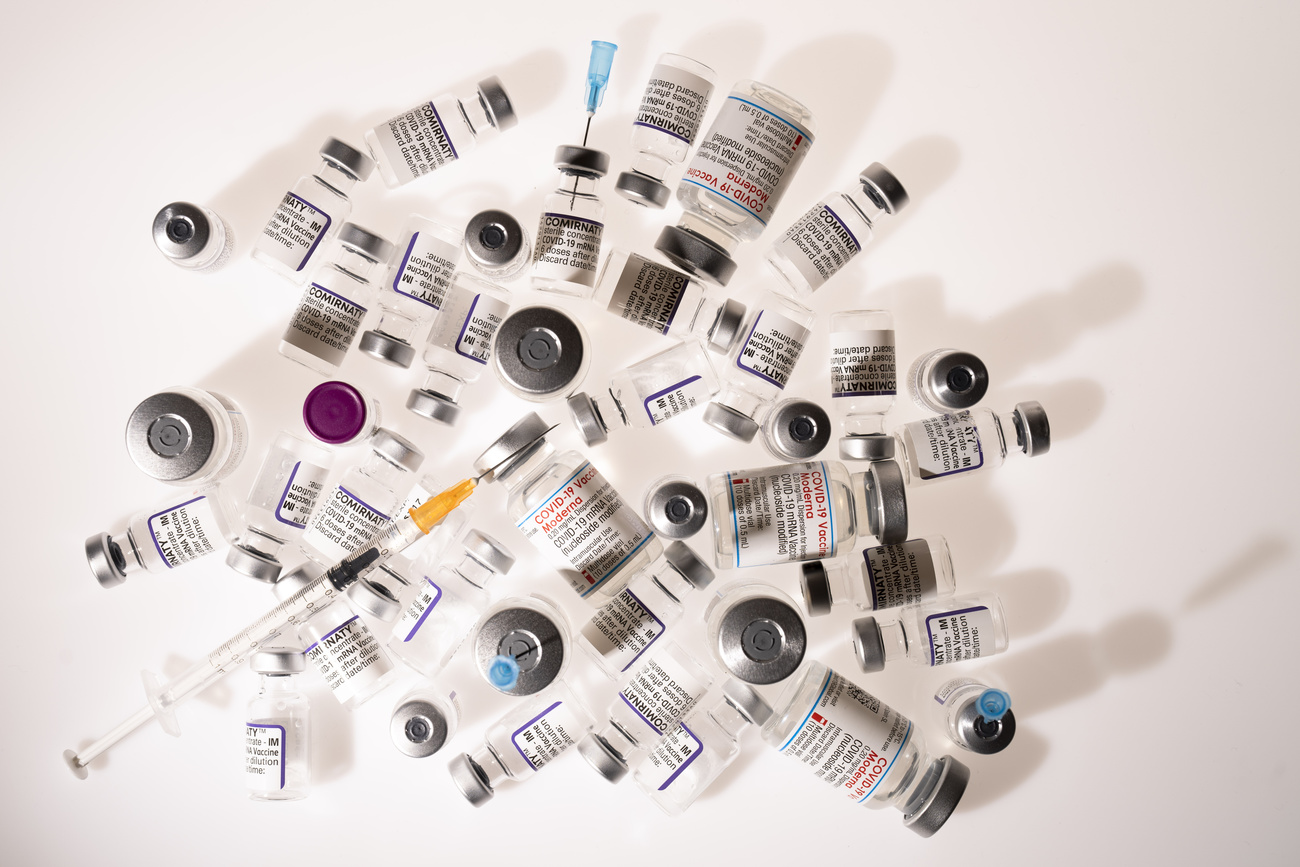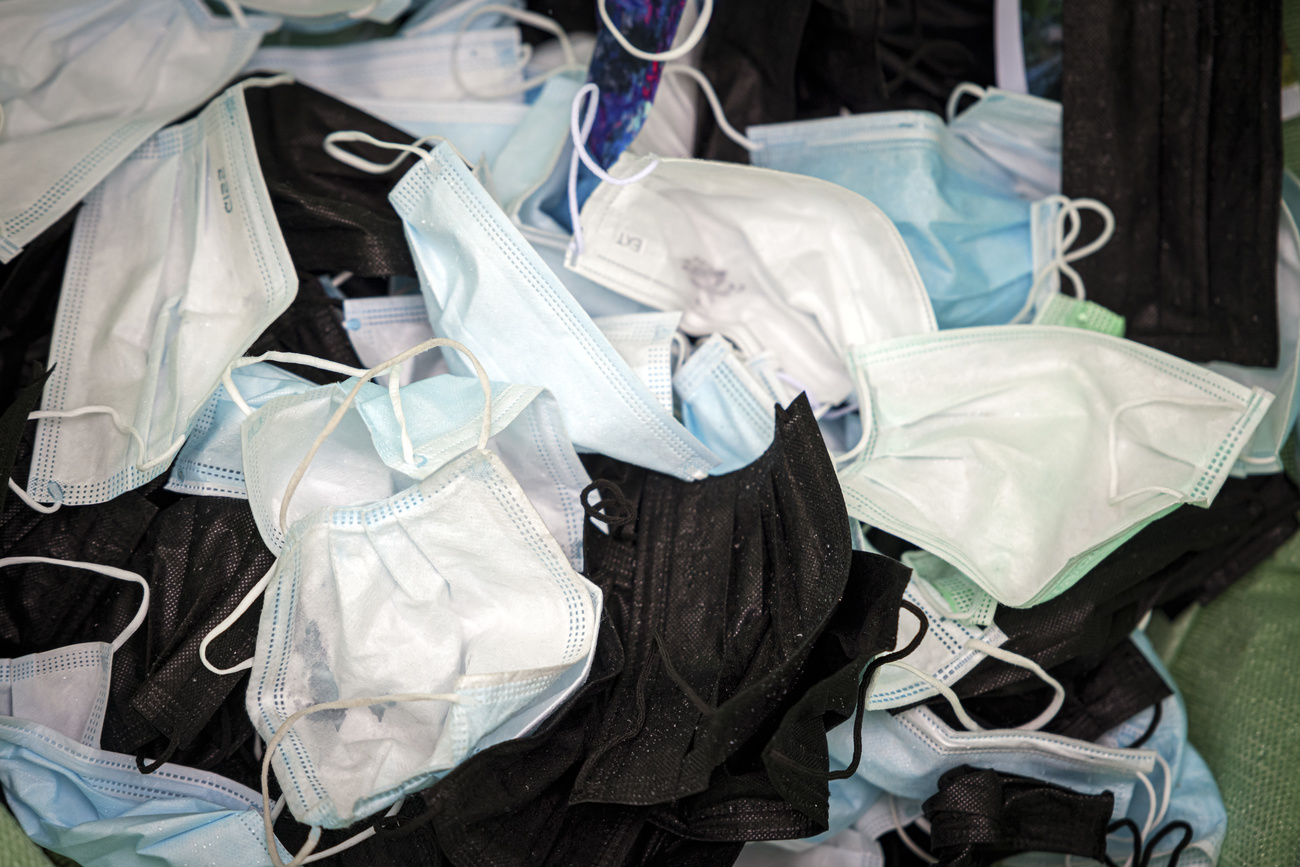
Covid vaccine doses go to waste in Switzerland amid huge stockpile

Swiss warehouses are bulging with unused Covid-19 vaccine doses, and more are on the way. But millions of out-of-date vials are being destroyed amid stagnating demand and complex negotiations over donating them to developing countries.
“The Swiss ordered way too much from the beginning – about four times as much as the population at one stage. And they just continued to put in orders,” Patrick Durisch, a health policy expert at the Swiss NGO Public Eye, tells SWI swissinfo.ch.
Worldwide, 13.3 billion doses of Covid-19 vaccines have been administered. In Switzerland, about 70% of the population have had at least one Covid dose, a figure that has barely moved over the past year. Only 11.5% got a booster jab in the past six months.
The reasons behind the vaccine fatigue, and pandemic weariness more generally, are multiple. They certainly include stronger immunity in the community, exhaustion about public health measures and better awareness about the dangers of Covid.
“The coronavirus has also lost some of its shock value in the public’s perception,” the Federal Office of Public Health (FOPH) told Swiss public radio, SRF.
But despite the fact that the pandemic is in the rear-view mirror for many in Switzerland, Covid-19 remains a public health emergency of international concern, the World Health Organization’s highest form of alert. Vaccines and treatments, alongside mitigation measures, have helped bring the pandemic under control. But the Covid crisis is at a transition point that continues to need “careful management”, the health agency saidExternal link on January 30.
As demand for Covid vaccines has collapsed, Switzerland, like many rich countries that over-ordered, finds itself with a massive stockpile on its hands. Millions of unused vials that have expired have already been destroyed. It is likely that millions more will end up in the trash this year, as they cannot be easily sold or donated to poorer nations to whom they were promised.

More
Coronavirus: the situation in Switzerland
Growing stockpile
The Alpine nation of 8.7 million is not short of Covid vaccines. The Federal Office of Public Health (FOPH) says it has a “ready-to-use” stockpile of 12.5 million doses and the government has committed to purchasing an additional 11.6 million shots this year.
But since the start of 2023, vaccinations have pretty much ground to a halt: 460 a day on average in February, compared with 3,300 a day the previous year.
FOPH spokesperson Simon Ming says its procurement strategy is “designed to cover all plausible scenarios to ensure that sufficient quantities of the best and most recent vaccines are available in Switzerland at all times”.
But some Swiss parliamentarians have criticised the country’s huge vaccine orders. In June 2022, parliament demanded that the government tear up orders for 14 million doses and re-negotiate contracts for half of this supply.
Peter Hegglin, a senator from the Centre Party, was one of those insisting on cuts to the Covid vaccine procurement budget. “It became clear relatively soon that Switzerland was procuring many times more vaccine doses than it needed,” he told the Aargauer Zeitung newspaper. “So the purchase should have been stopped or at least reduced much earlier.”
Ming from FOPH disputes this. “When the contracts were concluded, the evolution of the pandemic was still difficult to anticipate,” he says, stressing that FOPH had no further contractual obligations for Covid-19 vaccines beyond 2023.
Gone to waste
Each Covid vaccine dose has an expiry date and must be disposed of “at least six months” from the time of delivery, according to the FOPH, with the authorities increasingly forced to destroy the once-prized shots.
So far, the federal and cantonal authorities have binned 3.4 million doses. Another 5.9 million doses were stored as Swiss government property in a warehouse in Belgium for transfer to third countries. But after plans fell through to transfer the batch via the Covax vaccine-sharing scheme for developing countries, those vaccines also had to be destroyed locally after reaching their expiry date in autumn 2022. The warehouse was then closed.
Another 1.8 million doses of the current stockpile will expire by the end of May unless expiry dates are extended, the FOPH says. The total cost of the wastage so far is estimated at least CHF270 million ($290 million).

More
Covid: 140 million masks set to expire this year
This is a widespread problem among rich nations. The life science analytics firm AirfinityExternal link ranks Switzerland third behind Canada and Australia, just ahead of the UK and EU, in terms of Covid vaccine doses under contract per capita. While country-specific vaccine wastage data is not available, Airfinity estimates that a total of 1.4 billion doses may have gone to waste worldwide since vaccines were rolled out at the end of 2020.
Donating doses
The Swiss government does have a strategy to pass on unused doses. A year ago, it announcedExternal link that 34 million doses would be available to Swiss citizens and that, if they could not be used, up to 15 million shots would be donated to the Covax initiative. This policy is still valid. Up to 13 million doses may be resold or transferred if they are not used in Switzerland in 2023, the government saidExternal link in December.
But despite those promises, the latest data shows that Switzerland has only handed over 4.8 million doses to other countries so far while 3.3 million more are on the way. In total, 1.9 billion Covid doses have been donated to 146 countries to date via Covax, an initiative from the World Health Organization (WHO)and the Global Alliance for Vaccines and Immunization (GAVI).
Why has a wealthy country like Switzerland not passed on more via Covax or bilaterally?
There has been no opportunity for the resale of Covid-19 vaccine doses so far, says Ming: “Many high-income countries have used a strategy similar to that of Switzerland for the procurement of Covid-19 vaccines and thus accepted surpluses in the interest of supply security. Consequently, there has been a global oversupply of Covid-19 vaccine doses since the beginning of 2022.”
Switzerland prioritises donations through Covax, he says. But demand from poorer states has “stagnated at a low level”.
Vaccine transfers require complex trilateral agreements among the vaccine manufacturer, Covax and the federal government. Often, doses expire before the negotiations can be completed.
“They’ve destroyed millions of doses and tried to give others to Covax, but that’s a difficult process because pharma has a veto right over that. And even if they wanted to sell it to other countries, they cannot do as they wish. They always have to ask for permission,” says Durisch from Public Eye.
He criticises earlier “flawed” vaccine negotiations between the government and manufacturers that resulted in contracts full of confidentiality clauses and pharmaceutical companies having “the last word”.
“Governments were taken hostage with their consent. And for me that’s the key lesson that has to be learned,” says Durisch.
Planning for future pandemics
Talks over a future pandemic treaty have begun at the WHO to ensure the world’s response to the next big health crisis is not only more robust, but more equitable.
In February, the organisation released a “zero draft” External linkto member states and NGOs that contains several articles on vaccines. One proposed measure says governments should reserve 20% of any tests, vaccines or treatments developed for use in poorer countries to avoid a repeat of the “catastrophic failure” during the Covid-19 pandemic.
The text will now go through a lengthy negotiating process that is expected to continue into next year. One of the main bones of contention will be around intellectual property rights with resistance likely to come from rich Western countries that host pharmaceutical giants.
Edited by Sabrina Weiss

More
Waning pandemic dents drug company returns

In compliance with the JTI standards
More: SWI swissinfo.ch certified by the Journalism Trust Initiative






























You can find an overview of ongoing debates with our journalists here . Please join us!
If you want to start a conversation about a topic raised in this article or want to report factual errors, email us at english@swissinfo.ch.